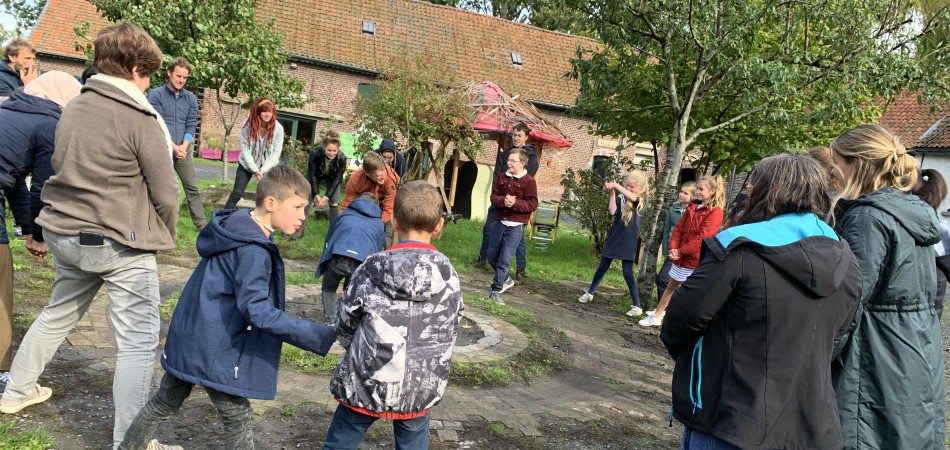“Welcome. What you pay attention to, grows.”
The battered, wooden sign greets visitors to De Heerlijkheid van Heule, an organic farm on the outskirts of Kortrijk, Belgium.
Heerlijkheid van Heule roughly translates as “Glory of the Hill” in Dutch.
Operated by Oranjehuis, a group home for at-risk youth, the farm combines the simplicity and beauty of nature with a restorative framework to provide opportunities for youth and families in crisis and community engagement for the surrounding village.
“For me, the farm is a place where I can go and I know that if I have a bad day, I will feel better,” said Mattias, a tour guide at Heerlijkheid van Heule.
There were many dark days in Mattias’ past.
Mattias easy smile and warm demeanor belie the fact that he grapples with behavioral health issues and is on the autistic spectrum. Before his 18th birthday, he was shuffled in and out of several hospitals and contemplated suicide. One day, Mattias visited an open house Heerlijkheid van Heule held for the local community. He instantly felt at home.
“Just being at the farm helps me,” said Mattias, now 24-years-old. “The place itself is peaceful and quiet.”
A Restorative Approach to Farming
Heerlijkheid van Heule is a working farm and restorative recreational center.
Oranjehuis bought the sustainable farm in mid-2005 with the help of the local Flemish community. The farm’s caretakers and neighborhood volunteers employ a restorative approach to organic farming by respecting people, animals, and the environment. From planting seeds to processing vegetables, the farm offers natural products and doesn’t use pesticides or other processing agents.
The husbandry of West Flemish red cows, grain cultivation and bread processing, and growing vegetables are among the farm’s chief agricultural activities.
The agricultural facets of Heerlijkheid van Heule cover approximately 8.5 hectares, half arable land. The smaller half comprises low meadows that form a flood basin for the Heulebeek, a major stream in West Flanders. The wettest part of the meadows at Heerlijkheid van Heule is developed as a nature preserve.
Visitors of all ages can come and walk around and through the farm. There is an interactive footpath, a walkway that crosses a lilting stream, and beautiful views of protected farmland. Community events featuring entertainment and delicious, Belgian dishes prepared with food grown on the farm are held throughout the year.
“We invite people to come and work in nature,” says Stijn Deprez, director of external communications for Ligand, a restorative practices training organization that partners with Heerlijkheid van Heule and Oranjehuis. “In the city, it’s very busy. Here, we help people get calm.”
Families in Crisis
Kortrijk is a modern city with an “Old World” soul.
Cars and bicycles race along its winding roads. Global retailers such as H & M and Zara have stores in the city’s shopping district. Kortijk’s association with the flax trade has made it one of the wealthiest cities in Flanders. However, beneath the polish of Kortrijk’s chic restaurants, thriving arts community, and ancient glamour of medieval architecture are families in crisis.
The promise of technology to create a global community has divided families – one in which screens have taken the place of conversations. In addition, the national housing crisis in which property and rental prices have skyrocketed while purchasing power has remained stagnant in the past days has trickled down and left a lot of families and older youths homeless. An influx of refugee children who have fled dangerous situations that no child should see adds another level of complexity.
“The behavior of the youngsters illustrates the problems in the community,” said Michael Michiels, an administrator at Ligand, a restorative practices training center in Kortrijk. “They are the most vulnerable in our community and show us the problems in the community.”
Ligand and its affiliates such as Oranjehuis and Heerlijkheid van Heule have stepped into the breech by applying a restorative practices framework to programs, services, and public spaces that help youth, families, and communities repair harm, restore broken relationships, and build social capital.
“If you don’t work with the family, chances are the problems will continue,” Michael said. “We work with families, schools and sometimes we find ourselves working with the whole neighborhood. There are people from everywhere working together.”
Cultivating a New Reality
The approach to restorative practices in Kortrijk happens actively and in nature.
Activity and nature loosen the grip of behavioral patterns and provide space for observation, insight, and new possibilities. This approach allows us to deepen our connections between ourselves and others in a setting that stimulates openness and understanding.
This potent combination also allows for individual, as well as collective change.
We build a new reality, not by forcing the world to conform to our whims; but by intentionally changing the DNA of our perceptions and behaviors. Places of restorative intention like Heerlijkheid van Heule allow that to happen.
“Even if you have a bad day, you can always learn something,” said Mattias about a recent experience while working at the farm. “Yesterday, I learned that not everything I think is what it seems.”
Mattias struggles with overthinking and overexaggerating as part of his autism diagnosis. He also struggles to be social. The tranquility of Heerlijkheid van Heule led Mattias to discover new parts of himself, like his facility with languages. Once silenced by facilities responsible for his care, Mattias speaks four languages fluently and now gives tours at the farm.
“In the city, I feel small,” Mattias said. “I don’t look around. When I come here, I straighten my back.”
